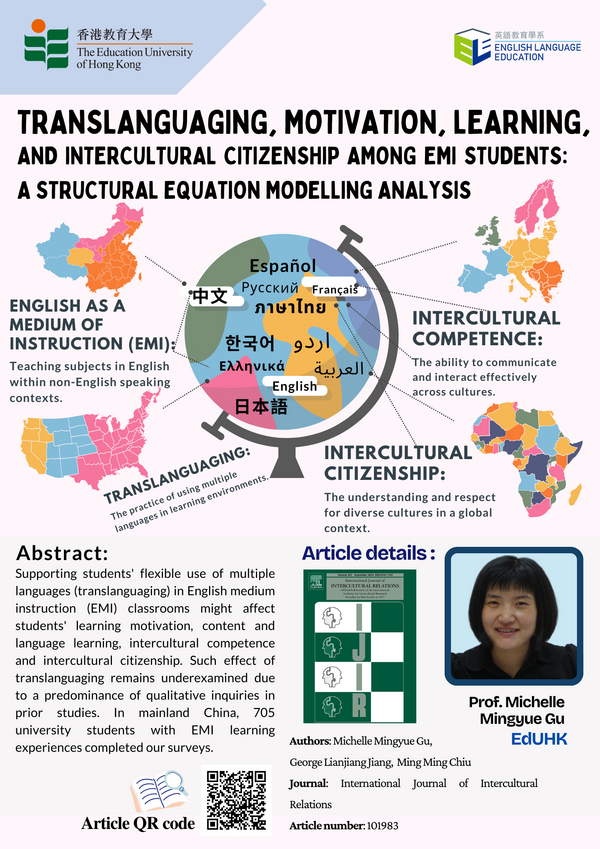Open Knowledge Hub
ELE's Open Knowledge Poster (#1)
Translanguaging

Translanguaging and Trans-Semiotizing
Dr Angel M. Y. Lin
Abstract
This chapter addresses translanguaging and trans-semiotizing as theoretical concepts and communicative practices and explores the different contextual influences of related scholarship. The ‘trans’ prefix has been increasingly used in discourse on globalization, and it refers to creativity and fluidity as much as to crossings. When applied to communication, the speakers/communicators constitute the focus, rather than languages. Different languages are not conceptualized to be discrete entities in themselves but are acknowledged to be social constructs and linguistic analytic descriptions. These social constructs and descriptions are commonly applied to the practices that people leverage from a larger linguistic and semiotic repertoire. In the chapter, the emergence of translanguaging and trans-semiotizing both as concepts and as specific terms to offer a dynamic process-oriented theorizing of communicative practices is discussed, and their evolution and take up according to particular goals and contexts is demonstrated. The term ‘translanguaging’ has strong links to pedagogy thus the chapter has a special focus on formal education, as well as on scholarship from different regions around the world.
- McKinney, C., Makoe, P., & Zavala, V. (2024). The Routledge Handbook of Multilingualism. Routledge.
ELE's Open Knowledge Poster (#2)
Teacher Education

Can the Monkey King break through the Jin-Gang-Quan’(金剛圈)?Overcoming the multiple contradictions in EMI education
Angel M. Y. Lin
Abstract
Upholding a critical, ethical, multilingual stance presents numerous challenges amidst a myriad of institutional, infrastructural, and societal pressures. Despite significant breakthroughs, such as translanguaging theories and pedagogies and the evolution of English as a Lingua Franca (ELF) principles, the journey towards a more inclusive and equitable English language education remains fraught with difficulties. Monolingual English continues to dominate assessments and academic publishing, and critical scholarship often appears powerless. I discuss the need for critical research to be grounded in praxis and discuss the struggle of EMI researchers against entrenched and renewed coloniality within increasingly neoliberalized academic institutions. I explore these contradictions in an imaginary dialogue between multiple voices. I then propose a research initiative (‘PAA-STELE’) aimed at overcoming the dominance of monolingual English assessment. I conclude that through collective action and a steadfast commitment to critical-ethical principles, we may effect change, albeit slowly and incrementally, within the English language education field.
- Lin, A. M. Y. (2024). Can the Monkey King break through the ‘Jin-Gang-Quan’ (金剛圈)? Overcoming the multiple contradictions in EMI education. Language and Education, 38(1), 139–147.
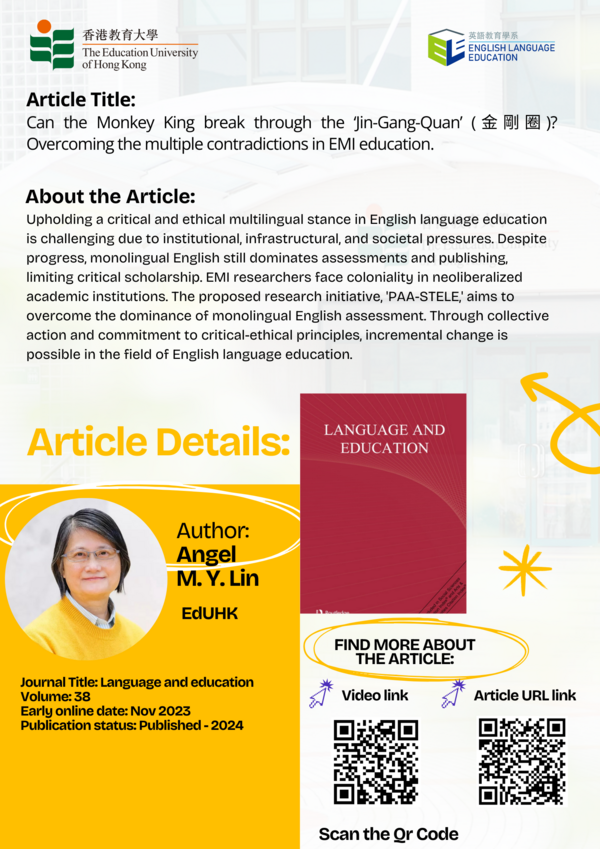
ELE's Open Knowledge Poster (#3)

Learner Identity and Investment in EFL, EMI, and ESL Contexts: A Longitudinal Case Study of One Pre-Service Teacher
Dr ZHANG, Yue Ellen
Abstract
When multilingual learners traverse across cross-border and study-abroad contexts, they enter different sociocultural spaces, negotiate conflicting identities, and may or may not invest in these identities. Addressing the lacuna, this longitudinal case study draws upon the model of investment to conduct a long-term, systematic investigation of the identities and investment of Miranda, a multilingual learner, and a pre-service teacher—as she studied, over seven years, as a university student (B.A.) in mainland China, a taught postgraduate student (M.Ed.) in Hong Kong, and a research student (M.Phil. and Ph.D.) in New Zealand. Findings reveal how Miranda negotiated, constructed, and performed multiple identities in shifting contexts and how the way her capital was valued shaped the way she positioned herself and was positioned by others. Attending to the fluidity and complexity of identities, this study provides educational authorities and teachers with implications for helping to chart the path for empowering students across contexts.
- Zhang, Y., & Huang, J. (2024). Learner Identity and Investment in EFL, EMI, and ESL contexts: A longitudinal case study of one Pre-Service teacher. Journal of Language, Identity, and Education, 1–14.
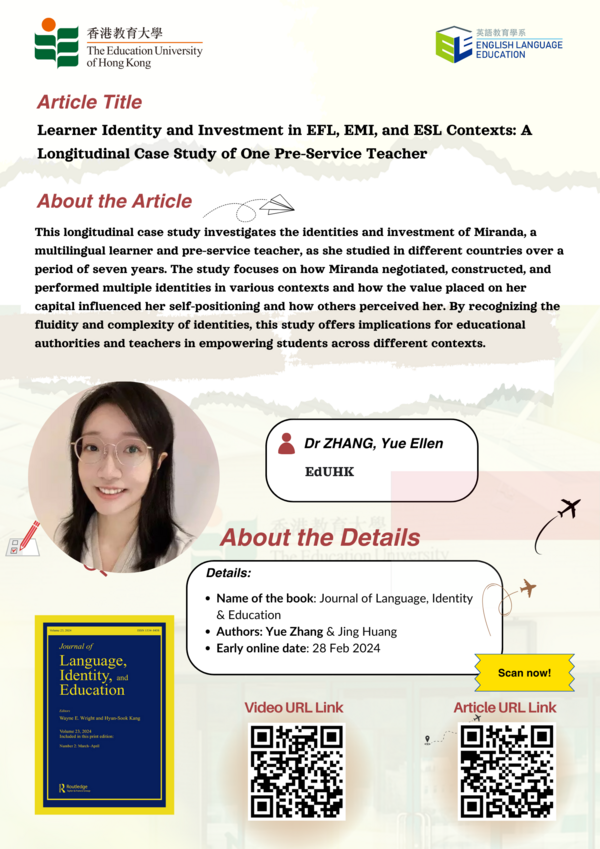
ELE's Open Knowledge Poster (#4)

Translanguaging for Doing Gender in English-Medium Classrooms in Hong Kong: Towards Critical CLIL in Plurilingual Settings
Dr. LIU, Yiqi, April
Abstract
Critical content and language-integrated learning (CLIL) has been advocated to attest raciolingusitic ideologies in plurilingual educational settings. However, little is known about how to help students in contesting inequalities about other structures of domination in bilingual education programs. This study aims to address this gap by examining the construction of gender identities in Secondary 4 (Grade 11) English-medium Liberal Studies lessons, which aimed to enhance awareness of gender equality and subject-specific English skills about the topic. The study shows that gender was constructed and reconstructed by conflicting multilingual and multimodal gendered discourses, including the formal curriculum, school lesson materials, and classroom interaction. The paper reveals that teachers and students jointly constructed masculinities of “real men,” “good men” and “gay men” in CLIL classrooms imbedded in curriculum contexts infused with gender dualism and alternative gender values began to emerge after the CLIL lessons. The results suggest that CLIL teachers can facilitate development of critical literacies about gender by enabling encounters of different voices in translanguaging and trans-registering spaces created by students’ familiar L1 everyday discourses and multimodal practices. Pedagogical implications were also discussed.
- Liu, Y. (2024). Translanguaging for Doing Gender in English-Medium Classrooms in Hong Kong: Towards Critical CLIL in Plurilingual Settings. Journal of Language, Identity, and Education, 1–17.
ELE's Open Knowledge Poster (#5)

An ethical analysis of how ESL teachers construct their professional identities through the use of information technology in teaching
Dr. GU Mingyue, Michelle
Abstract
While there is growing recognition of the mutually shaping relationship between teaching with information technology (IT) and teachers’ beliefs, skills and self‐efficacy, there has been a paucity of research attention on the construction of teacher identity during actual IT‐assisted in‐class teaching and out‐of‐class networking with students, in a full institutional and social context. This study investigates how a group of secondary school English as a second language (ESL) teachers regulated their teaching and practices and constructed their identities in relation to governmental requirements for the use of IT in teaching. Teachers from seven government‐subsidised schools in Hong Kong were interviewed about their experiences of using IT in teaching. We frame the reported practices of these teachers as a process of construction of identity, formed in the context of the ‘governmentality’ supporting current examination‐oriented educational policy. Observing from the perspective of what has been termed ‘governmentality’ and an ethical framework for self‐formation of personal identity makes it possible to see these teachers’ professional identities constructed through the use of IT practices within the contradictory conditions of professional/personal demands, compliance/resistance, school promotion/peer non‐cooperation, advantage/disadvantage in use of IT, use of IT/content and pedagogical knowledge. This study has implications for developing a more supportive and rational environment for the use of IT in teaching, in which more autonomy and identity options—rather than constraints—can be provided for teachers in the digital era. This study also informs practitioners and policy makers in other educational settings experiencing a similar IT boom in teaching.
- Gu, M. & Lai, C. (2019). An ethical analysis of how ESL teachers construct their professional identities through the use of information technology in teaching. British Educational Research Journal, 45 (5), 918-937.
ELE's Open Knowledge Poster (#6)

Multifunctionality of epistemic stance markers: Variation across disciplines and speaker roles in classroom discourse
Marcella Caprario
Abstract
This study investigated the communicative functions of ‘I think’ and ‘I guess’ in classroom discourse and intra-register variation in their use. Building on research into the multifunctionality of epistemic stance markers, a coding scheme was developed and iteratively applied to a corpus, revealing five macro functions: epistemic stance, softening, personal perspective, discourse organizing, and deciding in real time. The frequency of each macro function differed between the two markers, as did the observed subfunctions. Statistical analyses comparing instructors and students in three disciplines indicated intra-register variation, linked to situational differences. ‘I guess’ was most frequent in student language, and ‘I think’ was most frequent in the humanities. Different patterns were also noted in the use of certain communicative functions. The results suggest the importance of accounting for register variation when describing epistemic stance markers.
- Multifunctionality of Epistemic Stance Markers: Variation across Disciplines and Speaker Roles in Classroom Discourse. (n.d.). Retrieved January 1, 2023 https://www.sciencedirect.com/org/science/article/pii/S2666038523000142
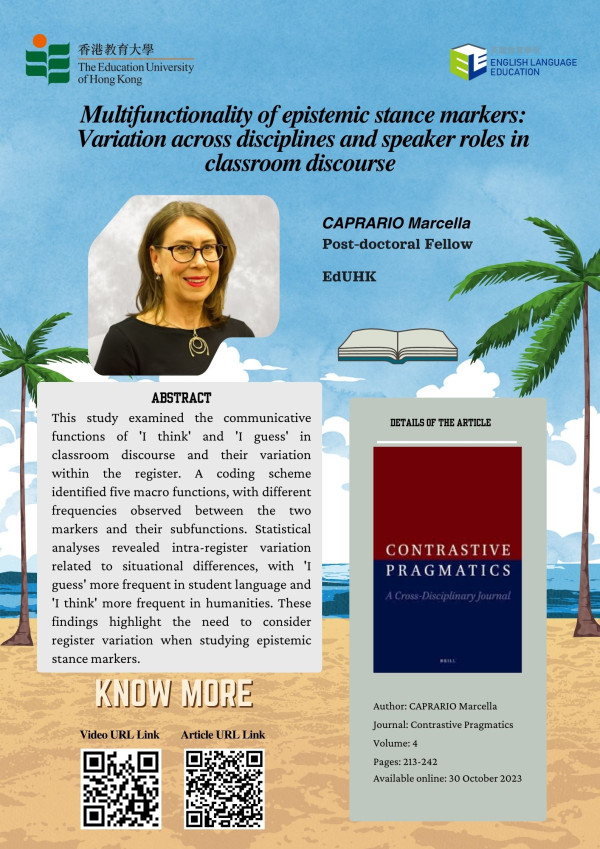
ELE's Open Knowledge Poster (#7) (#8)
E-Learning
.png)
When no one can go to school: Does online learning meet students' basic learning needs?
Dr. WONG Ming Har, Ruth
Abstract
What will happen if students cannot go to school and can rely on online learning? This study aimed to examine whether students’ basic learning needs could be met when teaching and learning can only be conducted through online mode. According to Ormrod (2011), the four basic learning needs are arousal, autonomy, relatedness and competence, which were used as the theoretical framework for this study. Mixed methods were used to evaluate whether basic learning needs were met. A total of 118 school students were recruited to a validated questionnaire and 36 of them joined an individual in-depth interview. Results showed that the basic learning needs of autonomy and competence were met through online learning but not the need of relatedness. Autonomy was found to have direct relationship with competence but not relatedness nor there was any relationship between arousal and other learning needs. It was so found that positive and adequate negative arousal could serve as a catalyst to facilitate effective online learning.
Basis Psychological Needs of Students in Blended Learning
Dr. WONG Ming Har, Ruth
Abstract
Traditional classroom setting has transitioned from a solely face-to-face, teacher-oriented instructional approach to an integrated, mixed-mode classroom learning dynamic. With this change of educational context, it is imperative to know: are students’ basic psychological needs being better met and fulfilled? To address this question, this paper adopted a mixed method to discover if, and how, blended learning meets students’ three basic psychological needs, specifically relatedness, competence and autonomy. Findings show that the first two need-constructs of relatedness and competence were fulfilled. The need for autonomy, however, was not being met due to school culture, assessment and the perhaps-habitual adherence to the conventional roles of teachers and students. This study also found that the three aforementioned psychological are positively related. In fact, blended learning has provided a new dimension of, and opportunity for, learning interactions for students of differing learning styles. Varieties of academic outputs released other expressions of “self” in many students, which enabled the first need for relatedness to be met. Blended learning outputs could bring a positive spiral of development of recognition from others, and meet the second need of competence later, leading to better identity formation, and ultimately again to relatedness.
- Wong, R. (2019). Basis Psychological Needs of Students in Blended LearningInteractive Learning Environments.
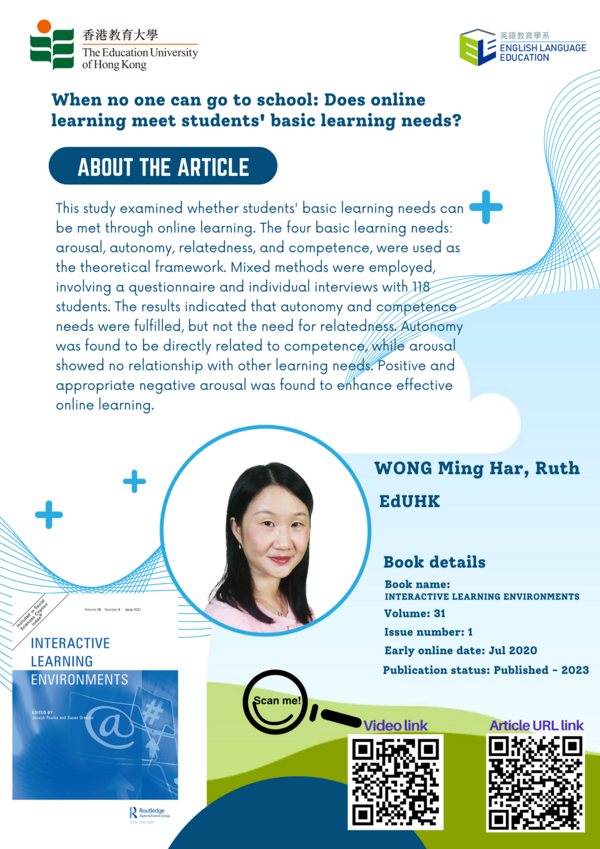
ELE's Open Knowledge Poster (#9) (#10)
_1619041063.jpg)
A systematic review of Informal Digital Learning of English: An ecological systems theory perspective
Dr. LEE Ju Seong
Abstract
Due to the rapid advancement of technology and its impact on English learning outside of the classroom, Informal Digital Learning of English (IDLE) has grown in popularity among English learners. However, understanding of this emerging phenomenon has been limited to individual characteristics, neglecting the wider environmental contexts that influence IDLE. We analyzed factors influencing one's perceptions or behaviors of IDLE in light of Bronfenbrenner's ecological systems theory using 103 IDLE-related papers published in A&HCI and SSCI journals between 2010 and 2021. The two most frequently mentioned factors were at the Individual (n = 161; e.g., personal interests and motivation) and Micro-system levels (n = 51; e.g., teachers, family, and friends). Our analysis also found that more research is needed at the Meso-system (n = 9; e.g., social network users and interaction with gamers), Exo-system (n = 11; e.g., parents' income/educational level and mass media), Macro-system (n = 24; e.g., globalization and cultural differences), and Chrono-system levels (n = 7; virtual intercultural experience). The study concludes with promising research agendas, such as school-based action research and the role of parental support, cultural norms, religious beliefs, and pandemic-induced online teaching on one's IDLE perceptions or behaviors.
- Guo, X., & Lee, J. S. (2023). A systematic review of Informal Digital Learning of English: An ecological systems theory perspective 7 System, 117.
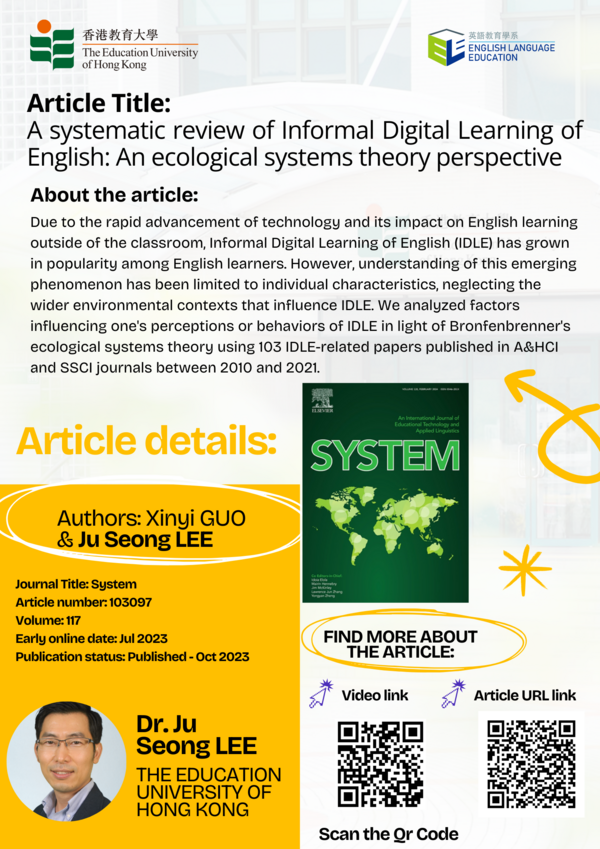
Informal digital learning of English and strategic competence for cross-cultural communication: Perception of varieties of English as a mediator
Dr. LEE Ju Seong
Abstract
This exploratory study examined the potential connections between informal digital learning of English (IDLE), strategic competence for cross-cultural communication and perception of varieties of English. A total of 266 Korean EFL university students, who had no overseas experience, filled in a questionnaire survey. Follow-up semi-structured interviews were also carried out to complement the quantitative data. Results of structural equation modelling showed that perception of varieties of English mediated the relationship between IDLE and strategic competence for cross-cultural communication. The qualitative data also confirmed that EFL students without overseas experience tended to adopt more effective cross-cultural communication strategies when their perception of different varieties of English became more positive through their engagement in IDLE activities. These results can offer pedagogical insights into how ELT researchers and teachers can better prepare contemporary English learners for cross-cultural interactions in multicultural environments, whether in digital or face-to-face milieus.
- Lee, J. (2020). Informal digital learning of English and strategic competence for cross-cultural communication: Perception of varieties of English as a mediator ReCALL, 32 (1), 47-62.
ELE's Open Knowledge Poster (#11)
_1619041088.jpg)
Flipped learning with Wikipedia in higher education
Dr. ZOU Di
Abstract
This project investigated how Wikipedia can be integrated into flipped learning in higher education through the project-based learning approach. It proposed a flipped learning model where Wikipedia was involved in creating a collaborative learning environment. Two groups of students participated in the research and were asked to complete group projects of creating Wikipedia entries, one of which learned in the flipped classroom, the other in the conventional classroom. An online collaborative learning platform, GMoodle, was developed to provide an interactive learning environment for the participants’ learning with Wikipedia. The results showed that learning with Wikipedia in the flipped classroom was more effective than learning with Wikipedia in the conventional classroom. The participants in the flipped group created more versions of Wikipedia entries. The flipped learning environment provided the students with more in-class collaboration and interaction opportunities, leading to more time and space for active learning.
- Zou, D., Xie, H., Wang, F., & Kwan, R. (2020). Flipped learning with Wikipedia in higher education Studies in Higher Education.
ELE's Open Knowledge Poster (#12)

Informal Digital Learning of English and willingness to communicate in a second language: self-efficacy beliefs as amediator
Dr ARTEM ZADOROZHNVY
Abstract
Informal Digital Learning of English (IDLE) is associated with willingness to communicate in a second language (L2 WTC). Although affective mediators (e.g. enjoyment and anxiety) have been found to influence the relationship between IDLE and L2 WTC, it is unclear whether cognitive factors influence IDLE’s effects on L2 WTC. This study aims to fill this gap by determining whether self-efficacy beliefs mediate the relationship between IDLE and L2 WTC among 246 Kazakhstani university EFL students. In contrast to previous research in other Asian contexts, our structural equation modelling results revealed that IDLE was not directly related to L2 WTC. Instead, self-efficacy beliefs acted as a full mediator between IDLE constructs and L2 WTC. These findings suggest that EFL students who participate in IDLE activities more frequently have a stronger belief in their own ability to perform various tasks in English, which leads to a greater willingness to communicate. This is the first research of its kind in Kazakhstani EFL context. This is also the first study to show that IDLE and L2 WTC are linked via a cognitive factor. Our research offers a context-specific pedagogical IDLE model to teachers and teacher educators in Kazakhstan and other similar EFL contexts.
- Zadorozhnyy, A., & Lee, J. S. (2023). Informal Digital Learning of English and willingness to communicate in a second language: self-efficacy beliefs as a mediator. Computer Assisted Language Learning, 1–21. https://doi.org/10.1080/09588221.2023.2215279
ELE's Open Knowledge Poster (#13)
Research Methodology
_1619041072.jpg)
Experimental and quasi-experimental designs
Dr. John ROGERS
Abstract
This chapter provides an overview of experimental and quasi-experimental research designs in the context of applied linguistics research. We begin by discussing key concepts, such as validity and reliability, before outlining steps and challenges when planning an experiment. Following this, descriptions of frequently used design types are provided, including pretest-posttest, latin-square, repeated measures, factorial, and time-series designs. Recent examples are used to illustrate the advantages and limitations of each approach. We further accentuate key features of each example study, with particular emphasis on how these features help control for threats to the internal and external validity of the findings. We end the chapter by summarising factors researchers should take into account when selecting and designing applied linguistics experiments. Link: https://www.researchgate.net/publication/334250281_Experimental_and_quasi-experimental_designs
- Rogers, J., & Révész, A. (2020). Experimental and quasi-experimental designs.In J. McKinley & H. Rose (Eds.), The Routledge Handbook of Research Methods in Applied Linguistics (pp. 133-144). New York: Routledge.
ELE's Open Knowledge Poster (#14)
Cross-cultural Education

Social structures, everyday interactions, and subjectivity—where (and how) does decolonizing begin?—Attending to desires, fears, and pains
Qinghua Chen & Angel M. Y. Lin
Abstract
When ‘decoloniality’ and ‘decolonizing’ have become words frequently used in conferences and journal publications in our field of Applied Linguistics/Language and Education, as well as on many academics’ lips, we start to worry about how they too can be easily co-opted as buzz words emptied of their critical meaning and actional potential and become appropriated as discourses with symbolic capital to add to one’s portfolio for academic promotion. What Kubota (2016) has cautioned about translanguaging can be equally true of the scholarship on decoloniality: … its knowledge is becoming another canon – a canon which is integrated into a neoliberal capitalist academic culture of incessant knowledge production and competition for economic and symbolic capital (p. 475). In this paper, we write about the pains, memories, fears, hopes and desires associated with experiencing colonizing acts across different timescales: in one’s everyday life (e.g. micro aggressions in social interactions), in how one’s own sense of self and the world (subjectivity) is shaped and reshaped (e.g. through academic socialization), and in embarking on what can be done to change the various social structures of (both colonial and other kinds of) domination and subordination. The journey is never purely academic or intellectual as it is always embodied, evoking painful memories, fears and discomfort. And from this journey of sorting out what has happened to us (and many people like us) who have been subjected to the exercising of colonial power mediated through many diverse agents, across many shorter-timescales happenings as well as longer-timescales events and processes (Lemke, 2000, 2008), we aim at finding a pathway ahead that is over and beyond just research publications and presentations. No doubt, research publications and presentations are important as a starting point, but they must lead to some further actions for them to be truly decolonizing (and not just ‘knowledge about decolonizing’). Then we’ll propose a tentative thinking and planning tool to work with teachers, students, administrators, policy makers and most importantly ourselves, to grasp what it means/what it takes, and simultaneously begin to work, to ‘decolonize’ ourselves, our curriculum, our pedagogy, our scholarship and then gradually our field of Language Studies and Education.
- Chen, Q., & Lin, A. M. Y. (2023). Social structures, everyday interactions, and subjectivity—where (and how) does decolonizing begin?—Attending to desires, fears, and pains. Critical Inquiry in Language Studies, 20(2), 105–126. https://doi.org/10.1080/15427587.2023.2219059
ELE's Open Knowledge Poster (#15)
Second Language Acquisition
_1619041132.jpg)
Cross-cultural transitions in a bilingual context: The interplays between bilingual, individual and interpersonal factors and adaptation
Dr. YU Baohua
Abstract
As a regional hub for education, Hong Kong has seen a growing population of international students. In contrast to existing conceptual models in acculturation literature that are typically devoted to studying long-term settlers such as migrants or refugees in English speaking countries, this study develops and tests a fine-grained model for degree-seeking mobile students in East Asia. A mixed-method study was conducted: a survey of 619 international students across six Hong Kong universities and focus group interviews with 22 Asian and nine non-Asian students. Bilingual competences were found to play significant roles in predicting sociocultural adaptation together with academic efficacy, social support, contact with locals, and psychological adaptation. This study offers practical and managerial insights for educational policymakers, university senior management and administrations, academicians, and research communities on how to manage the expansion and accommodate the needs of international students so that we can cater for a culturally diverse body of students. This research is significant because it extends the literature by examining sociocultural adjustment during crosscultural transitions in the increasingly globalised context of Hong Kong.
- Yu, B., Vyas, L. & Wright, E. (2020). Cross-cultural transitions in a bilingual context: The interplays between bilingual, individual and interpersonal factors and adaptation Journal of Multilingual and Multicultural Development.
ELE's Open Knowledge Poster (#16)

Processing and Comprehension of Locally Ambiguous Participial Relative Clause Sentences in Russian
Liubov Darzhinova & Zoe Pei-sui Luk
Abstract
The study tested how the Recency Preference and Predicate Proximity model (Gibson et al. in Cognition 59(1):23–59, 1996, https://doi.org/10.1016/0010-0277(88)90004-2) plays out by examining the attachment preferences of native Russian speakers when processing locally ambiguous participial relative clause sentences with three potential NP attachment sites in Russian. Using a self-paced reading task, reading times and noun phrase selection responses were collected. Results showed significantly shorter reading times at the disambiguating region and higher accuracy rate of selection in the high-attaching condition than in the middle- and low-attaching conditions. No significant differences were found between the middle- and low-attaching conditions. We argue that Predicate Proximity is a much stronger factor than Recency Preference in Russian.
- Darzhinova, L., Luk, Z.Ps. Processing and Comprehension of Locally Ambiguous Participial Relative Clause Sentences in Russian. J Psycholinguist Res 53, 15 (2024). https://doi.org/10.1007/s10936-024-10041-4
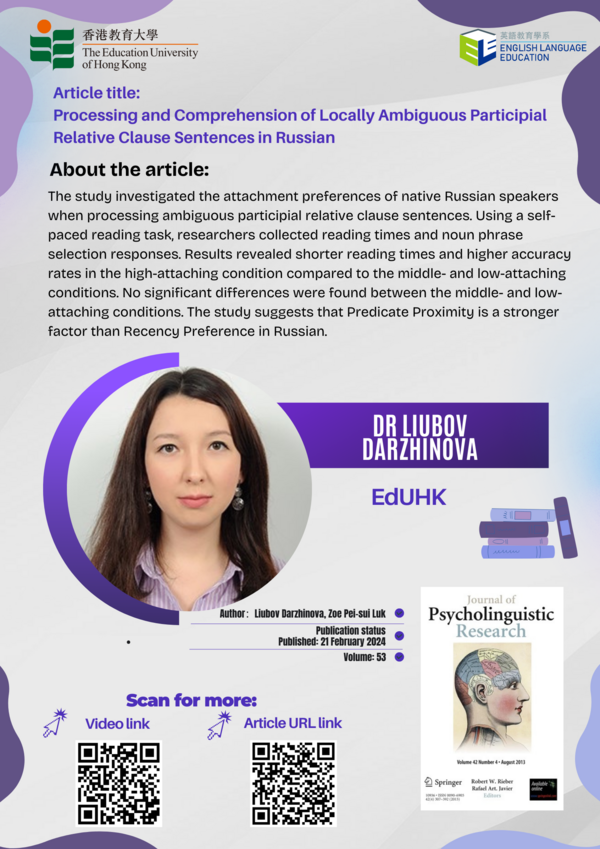
ELE's Open Knowledge Poster (#17)
Investigation of factors underlying foreign language classroom anxiety in Chinese university English majors
Shuting ZHANG, Chun LAI
Abstract
Previous research on foreign language classroom anxiety (FLCA) has reported inconsistent findings. One significant reason is that these studies mainly adopted a data-driven approach and lacked a strong theoretical basis. This study thus examined the factors underlying FLCA with worry-emotionality theorization of anxiety (Liebert, Robert M. & Larry W. Morris. 1967. Cognitive and emotional components of test anxiety: A distinction and some initial data. Psychological Reports 20. 975-978). A preliminary survey was conducted to validate the original FLCAS with 603 English majors from two Chinese universities, and 20 of them were invited for individual interviews to better understand the factors contributing to their FLCA. Based on these, a questionnaire was constructed through adapting the Foreign Language Classroom Anxiety Scale (FLCAS) and used in a main survey among 557 Chinese university English majors. Exploratory factor analysis (EFA) and confirmatory factor analysis (CFA) were performed to analyse the survey data, while thematic analysis was used to analyse the interview data. In addition to three factors reported in the FLCA factor validation literature, communication apprehension, self-confidence in speaking English and fear of negative evaluation, this study identified peer pressure as a new factor. The findings reveal the multidimensional nature of FLCA and support the worry-emotionality theorization of anxiety. Implications for the conceptualization of FLCA are discussed. Copyright © 2023 Walter de Gruyter GmbH, Berlin/Boston.
- Zhang, Shuting and Lai, Chun."Investigation of factors underlying foreign language classroom anxiety in Chinese university English majors" Applied Linguistics Review, 2023. https://doi.org/10.1515/applirev-2021-0062
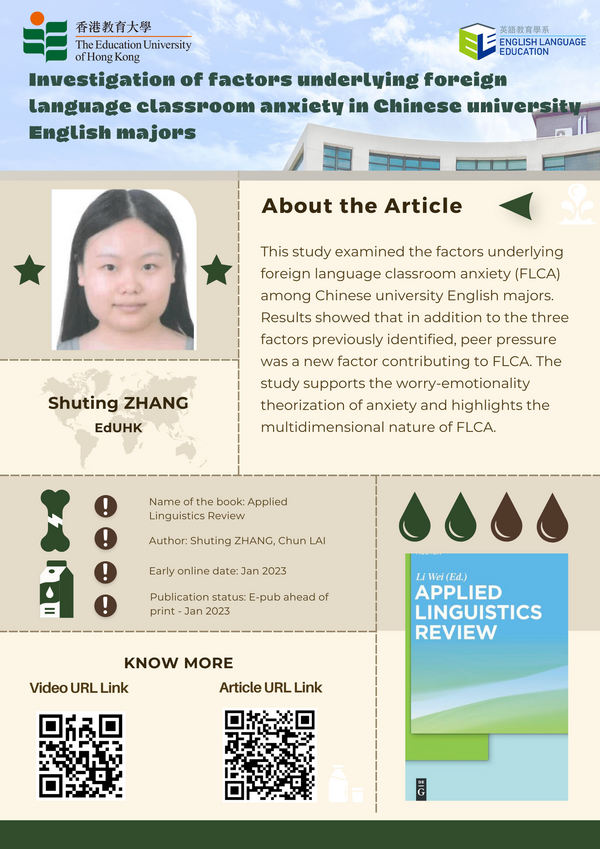
ELE's Open Knowledge Poster (#18)

Unlocking CLIL success: exploring the interplay between students' self. regulation levels, linguistic challenges and learning outcomes in Hong Kong secondary educationtext
Alfred Lo
Abstract
The pedagogical approach—Content and Language Integrated Learning (CLIL)—has been widely adopted around the globe with its dual aims of developing students’ second language (L2) proficiency and mastering content knowledge simultaneously. However, its effectiveness remains inconsistent. This inconsistency has led researchers to call for an investigation into the perspectives of CLIL students to understand the factors behind the success and failure of CLIL implementation. To address this gap, this study explores CLIL students’ perspectives through the lens of self-regulation and examines the relationships between CLIL students’ self-regulation levels, linguistic challenges, and learning outcomes. Involving 167 junior secondary students from three schools in Hong Kong that adopted different CLIL models in Hong Kong, the study revealed moderate self-regulation levels and varying linguistic challenges among CLIL students, with listening being identified as the most difficult skill. A significant, moderately positive correlation was found between self-regulation levels and perceived linguistic challenges. Multiple regression analysis also found that motivation was a key predictor of both L2 proficiency and content subject achievement, while other self-regulation constructs (self-preparation, self-monitoring, and self-reflection) showed non-significant predictive values. Pedagogical implications are provided to develop students’ self-regulation skills and address perceived linguistic challenges, ultimately enhancing the learning experience and outcomes for CLIL students of diverse abilities.
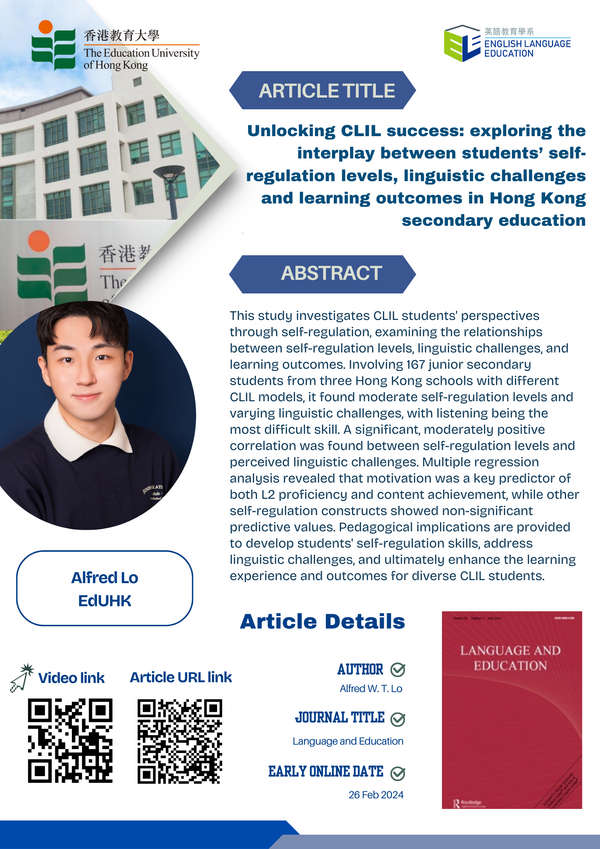
ELE's Open Knowledge Poster (#19)

Realizing the sustainability of portfolio assessment in second-language writing
Dr MAK, Wing Wah Pauline
Abstract
Portfolio assessment, as an alternative writing assessment approach, has received growing attention in the past few decades. Although the benefits of portfolio assessment are well validated, there is a dearth of empirical research on how portfolio assessment can be sustained over time and the support teachers need to sustain portfolio assessment practice in their teaching contexts. To fill this significant void, the present study examines the influences that contribute to the sustainability of portfolio assessment in second-language writing. Drawing on data from interviews with the principal, English department chair and four English teachers from one elementary school in Hong Kong, as well as classroom observation and teachers’ team meeting observation, the study revealed that administrators’ role in dispersing decision-making authority to teachers, exploiting learning opportunities and providing a stimulating environment for teachers, and the sharing of common vision and goals, as well as collective flows of learning among team members, are the cornerstone of transformation and sustainability for the practice of portfolio assessment. The paper concludes with practical implications on how the innovative attempts in portfolio assessment can be sustained over time.
- Mak, P., & Wong, K. M. (2024). Realizing the Sustainability of Portfolio Assessment in Second-Language Writing. RELC Journal, 0(0). https://doi.org/10.1177/00336882241235955
ELE's Open Knowledge Poster (#20)
E-Learning Tool

Enhancing Collaboration and Digital Literacy in the Classroom by using Google Slide
WONG, Ka Ho Denis
Teaching Methods
Dr. Denis Wong, an expert in the field of English Language Teaching (ELT), has introduced Google Slide as an innovative e-learning tool in his lessons for aspiring English teachers. This powerful resource not only promotes collaboration and digital literacy among students but also fosters a seamless exchange of ideas through script discussions and presentations.
By incorporating Google Slide into his teaching methodology, Dr. Wong aims to enhance lesson engagement by providing an interactive platform where students can work together, share their thoughts, and develop their language skills. This approach allows for the creation of diverse teaching activities, such as group projects, peer evaluations, and multimedia presentations, which cater to various learning styles and preferences.
In conclusion, Dr. Denis Wong's integration of Google Slide into his English teaching lessons has proven to be a valuable asset in creating a dynamic, engaging, and effective learning environment for aspiring English teachers. By leveraging the power of technology, educators like Dr. Wong can continue to enhance the teaching and learning experience, ultimately leading to the development of more confident and skilled English language teachers.
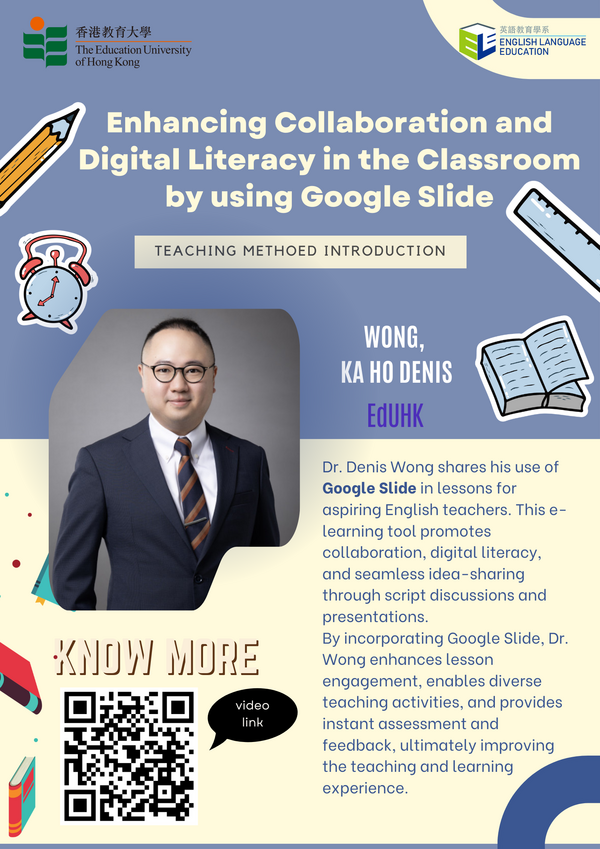
ELE's Open Knowledge Poster (#21)

Empowering Language Learners through Innovative Projects and School Partnerships
Dr TAYLOR, Timothy William
Teaching Methods
Dr. Taylor-led ELE Department projects focus on harnessing technology and interest to sustain students' motivation and engagement in English language learning. These projects aim to integrate innovative teaching approaches and students' personal interests to boost their confidence and competence in English learning. Project resources and a wide range of teacher experience-sharing content are gathered at the teacher-driven professional development hub: eTEACHERS.online. This platform provides an interactive, collaborative, and communicative space for teachers to share teaching strategies, resources, and best practices, ultimately enhancing the quality of instruction.
To access the site, follow the QR code here or visit: http://www.eteachers.online. On this website, you will find various teaching resources, including instructional videos, lesson plans, workshop materials, and more, to support teachers in innovating and experimenting with new approaches in their daily teaching. The platform encourages teachers to continuously learn and grow, providing a more engaging and effective English learning experience for students.
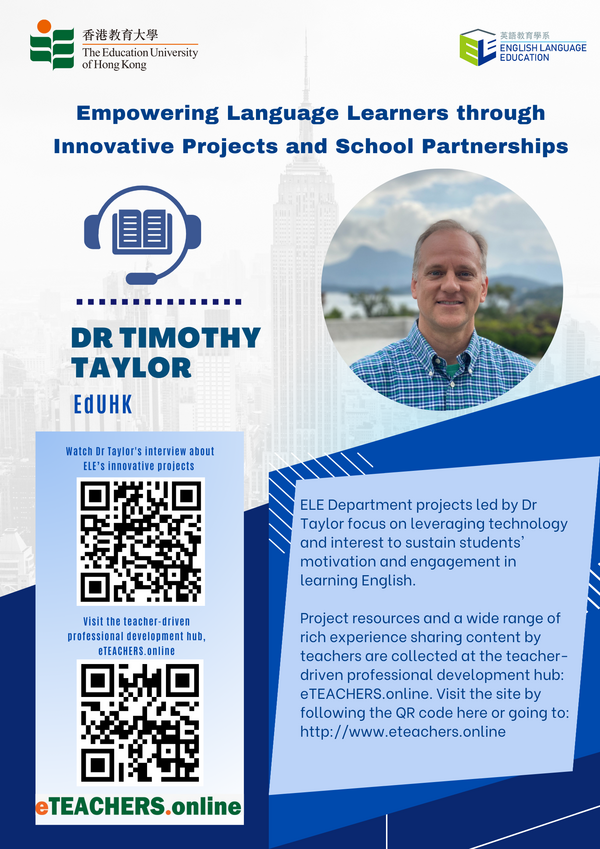
ELE's Open Knowledge Poster (#22)

Navigating the Digital Turn: Recent Books on Technological Integration in ELT
Dr Kohnke, Lucas
Abstract
As a practitioner and researcher in the field of second language (L2) instruction, my journey from the chalkboard to the digital dashboard has spanned nearly two decades. Therefore, I have approached this survey review of six recent publications on language learning using technology with a dual perspective. I began exploring the innovative use of technology in the classroom when I was a secondary school teacher. I experimented with the ‘latest’ (at the time) multimedia tools and online activities, including language labs, CD-ROMs, educational software programs (e.g., Hot Potatoes) and blogs. This early curiosity evolved into a commitment to enhancing second language acquisition (SLA) through technology.
Over time, I embraced the digital revolution, transitioning from using pre-existing material to developing my own instructional applications, chatbots and mobile games to make SLA interactive for my university students. Outside of the classroom, I have focused on empirical research assessing the efficacy and appeal of educational technology tools, as well as how they are perceived by teachers and learners. Today, my primary aim is to prepare the next generation of English language teachers to evaluate and skillfully integrate emerging technologies into their practices.
- Lucas Kohnke, Navigating the digital turn: recent books on technological integration in ELT, ELT Journal, Volume 78, Issue 2, April 2024, Pages 216–233, https://doi.org/10.1093/elt/ccae014
ELE's Open Knowledge Poster (#23)
Language attitudes

Language attitudes and fluid identities: perceptions from Shenzhen-Hong Kong cross-border students
Dr HUANG, Jing Peter
Abstract
Shenzhen-Hong Kong cross-border students (CBS) represent a distinctive Hong Kong student community residing in Shenzhen, a city within Mainland China. Their lifestyle bridging these two cities has wielded significant influence over their language attitudes and identities. This research adopts a quantitative approach, conducting a questionnaire survey among 505 CBS individuals to explore their attitudes towards Putonghua, English, Cantonese, and their hometown dialect, as well as their identities. Findings reveal that Putonghua receives the highest ratings in both integrative and instrumental dimensions, the hometown dialect receives the lowest instrumental rating while English scores lowest from the integrative perspective. Notably, CBS demonstrates a stronger Chinese national identity compared to native Hong Kong residents. Their regional identity is characterised by a prevalent ‘dual identity’ embracing both Shenzhen and Hong Kong. Merely about one-fourth of the students identify with their social role as ‘CBS’. Statistical analysis emphasises the tangible impact of CBS’ language attitudes on their identities. The frequent and intimate social interactions between CBS and Mainland China emerge as a pivotal factor contributing to their notably more favourable attitude towards Putonghua and heightened national identity, distinguishing them from native Hong Kong residents.
- Liang, Z., Huang, J., & Zhao, C. (2024). Language attitudes and fluid identities: perceptions from Shenzhen-Hong Kong cross-border students. Journal of Multilingual and Multicultural Development, 1–14. https://doi.org/10.1080/01434632.2024.2340682
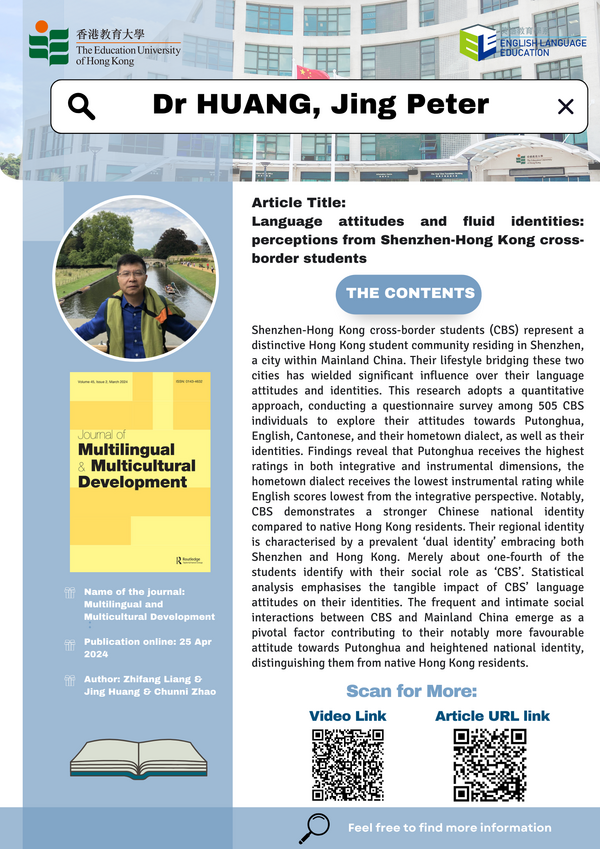
ELE's Open Knowledge Poster (#24)
Pedagogical Strategies

ELF communication strategies: A pedagogical intervention pilot study
Marcella Caprario
Abstract
This study investigated the feasibility and effectiveness of ELF communication strategy instruction for university students’ communicative competence. Conceptual studies on ELF-informed pedagogy stress the importance of teaching strategies, which promote mutual understanding and positive relationships, but few empirical pedagogical studies exist. This gap seriously hinders efforts to develop more inclusive English language and intercultural communication teaching practices that meet real-world communication needs. In response, this pilot study developed and tested the effectiveness of instructional materials and assessment instruments for teaching ELF communication strategies. These materials were pilot tested with 26 L1 and LX English speaking participants. The two assessments resulted in statistically significant improvements from pre- to posttest with small effect sizes. Participant opinion survey responses were overwhelmingly positive. Based on these encouraging preliminary results, follow-up pedagogical studies should expand on this pilot study to yield a more comprehensive understanding of ELF communication strategy instruction.
- Caprario, M. (2024). ELF Communication Strategies: A Pedagogical Intervention Pilot study. TESOL Quarterly. https://doi.org/10.1002/tesq.3309
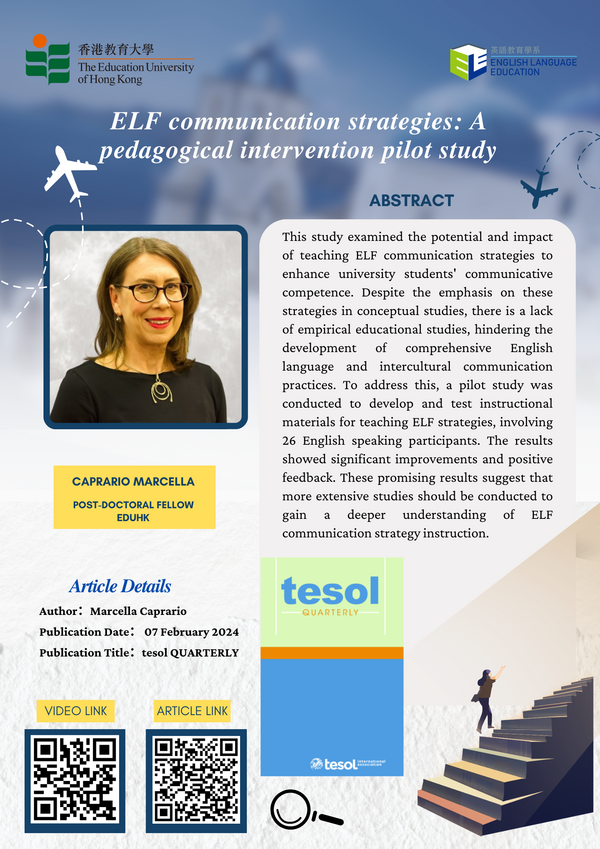
ELE's Open Knowledge Poster (#25)

Effects of extramural English activities on willingness to communicate: The role of teacher support for Chinese EFL students
Dr. Linlin LIU
Abstract
Extramural English (EE) with teacher support may work more effectively for Asian EFL learners' willingness to communicate in a second language (L2 WTC) given their sociocultural and educational contexts. Therefore, a teacher-supported EE program was developed to help students transit from teacher-controlled to learner-driven EE activites. Ninety Chinese EFL university students were randomly assigned to three groups: EE (n = 30), teacher-supported EE (n = 30), and conventional class (n = 30). Pre-post (trait-like WTC) and real-time survey (state-like WTC) results showed that the teacher-supported EE group outperformed the other groups in improving their L2 WTC. Interviews (n = 20) identified five factors that influenced the enhancement of their L2 WTC: emotional support from peers and teachers, teachers’ cognitive and pedagogical support, a low affective filter, increased topical knowledge, and increased English lexical knowledge.
- (Liu, L., Guan, W. J., Qiu, Y., & Lee, J. S. (2024). Effects of extramural English activities on willingness to communicate: The role of teacher support for Chinese EFL students. System, 124, 103319. https://doi.org/10.1016/j.system.2024.103319).
ELE's Open Knowledge Poster (#25)

Effects of extramural English activities on willingness to communicate: The role of teacher support for Chinese EFL students
Dr. Ju Seong LEE
Abstract
Extramural English (EE) with teacher support may work more effectively for Asian EFL learners' willingness to communicate in a second language (L2 WTC) given their sociocultural and educational contexts. Therefore, a teacher-supported EE program was developed to help students transit from teacher-controlled to learner-driven EE activites. Ninety Chinese EFL university students were randomly assigned to three groups: EE (n = 30), teacher-supported EE (n = 30), and conventional class (n = 30). Pre-post (trait-like WTC) and real-time survey (state-like WTC) results showed that the teacher-supported EE group outperformed the other groups in improving their L2 WTC. Interviews (n = 20) identified five factors that influenced the enhancement of their L2 WTC: emotional support from peers and teachers, teachers’ cognitive and pedagogical support, a low affective filter, increased topical knowledge, and increased English lexical knowledge.
- (Liu, L., Guan, W. J., Qiu, Y., & Lee, J. S. (2024). Effects of extramural English activities on willingness to communicate: The role of teacher support for Chinese EFL students. System, 124, 103319. https://doi.org/10.1016/j.system.2024.103319).
ELE's Open Knowledge Poster (#26)

Translanguaging, motivation, learning, and intercultural citizenship among EMI students: A structural equation modelling analysis
Prof. Michelle Mingyue Gu
Abstract
Supporting students' flexible use of multiple languages (translanguaging) in English medium instruction (EMI) classrooms might affect students' learning motivation, content and language learning, intercultural competence and intercultural citizenship. Such effect of translanguaging remains underexamined due to a predominance of qualitative inquiries in prior studies. In mainland China, 705 university students with EMI learning experiences completed our surveys.
- Gu, M. M., Jiang, G. L., & Chiu, . M. M. (2024). Translanguaging, motivation, learning, and intercultural citizenship among EMI students: A structural equation modelling analysis. International Journal of Intercultural Relations, 100, Article 101983. https://doi.org/10.1016/j.ijintrel.2024.101983
ELE's Open Knowledge Poster (#27)

'Fostering Linguistic Equality: The SISE Approach to the Introductory Linguistics Course by Sarah E. Hercula (2020)
Liubov Darzhinova
Abstract
In the article that appeared in the Journal of Language and Discrimination, Dr Liubov Darzhinova offers the review of the book written by Dr Sarah Hercula. One of the ideas permeating the book is that the way language is portrayed in movies, news, advertising, and social media has a powerful influence on our unconscious biases and perceptions. Seeking to address the linguistic stigma through pedagogical solutions, the book's author presents an introductory linguistics course.
- Darzhinova, L. (2024). ’Fostering Linguistic Equality: The SISE Approach to the Introductory Linguistics Course’ by Sarah E. Hercula (2020). Journal of Language and Discrimination, 8(1), 130-134. https://doi.org/10.1558/jld.27384
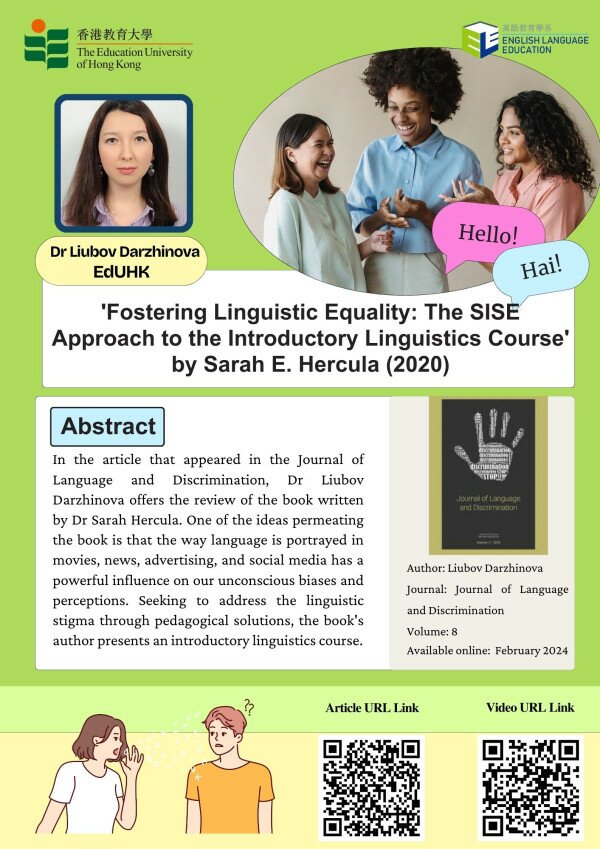
ELE's Open Knowledge Poster (#28)

World Englishes Pedagogy: Constructing Learner Identity
ZHANG, Yue Ellen
Abstract
This article examines the impact of a critical pedagogy informed by the World Englishes and investment frameworks on a second language (L2) learner in Hong Kong who claims to use 'Hong Kong English' (HKE). Taking a critical and pro-active stance, we seek to counter insidious (neo)colonial ideologies and practices through our pedagogical investigation in an undergraduate course. Multimodal output during the intervention was jointly analyzed to gauge the impact of the pedagogy on one learner's investment trajectory. The findings revealed that the participant-learner managed to invest in multiple intertwined identities as Hongkonger, legitimate HKE user and as an L2 English learner. The participant- learner challenged her exonormative orientations to become an invested, self-reflective learner who endorses and embodies endonormative norms in her local English.
- Yue Zhang, Wilkinson Daniel Wong Gonzales, World Englishes pedagogy: constructing learner identity, ELT Journal, 2024;, ccae053, https://doi.org/10.1093/elt/ccae053

ELE's Open Knowledge Poster (#29)

Exploring EAP students' perceptions of GenAI and traditional grammar-checking tools for language learning
Dr Lucas Kohnke
Abstract
The rapid development of generative artificial intelligence (GenAI) tools (e.g. ChatGPT) has elicited mixed reactions among English language instructors and learners. This study explores how first-year students in an English for Academic Purposes (EAP) course at a Hong Kong university perceive GenAI and traditional grammar-checking tools (e.g. Grammarly, MS Word). We employed a qualitative methodology grounded in the interpretivist paradigm, conducting semi-structured interviews with 14 students. The findings revealed the students perceived GenAI tools to be more comprehensive and authoritative, as they provide detailed explanations and contextual insights that enhance language proficiency. However, they also noted concerns about overreliance, data privacy and equitable access to premium features. The study examines the ethical and pedagogical implications of integrating GenAI tools into higher education, highlighting their potential and the necessity of institutional guidance. It contributes to the ongoing discourse on the role of GenAI in academic writing instruction.
- Lucas Kohnke, Computers and Education: Artificial Intelligence, December 2024, 1002792024. https://doi.org/10.1016/j.caeai.2024.100279

ELE's Open Knowledge Poster (#30)
AI in ELT
_1741574182.png)
A systematic review of conversational AI tools in ELT: Publication trends, tools, research methods, learning outcomes, and antecedents
Ms Wan Yee Winsy Lai, Dr Ju Seong Lee
Abstract
This review analyzed the trends in conversational AI tools in ELT from January 2013 to November 2023. The study examined 32 papers, focusing on publication trends, tool types, research methods, learning outcomes, and factors influencing their use. Findings revealed a gradual increase in publications, with 4 (12%) from 2013 to 2021, 13 (41%) in 2022, and 15 (47%) in 2023. All studies (100%) were conducted in Asian EFL contexts. Among the AI chatbots, Google Assistant (25%) was the most widely used. Quasi-experimental (45%) and cross-section (41%) research designs were commonly employed. Mixed-method (50%) approaches were prevalent for data collection and analysis. Conversational AI yielded positive outcomes in affective (43%) and cognitive skills (41%). The main factors influencing user perceptions or behaviors were individual (47%) and microsystem layers (31%). Future studies should (a) include diverse contexts beyond Asia, (b) consider the use of up-to-date tools (e.g., ChatGPT), (c) employ rigorous experimental designs, (d) explore behavioral learning outcomes, and (e) investigate broader environmental factors. The systematic review enhances current knowledge of recent research trends, identifies environmental factors influencing conversational AI tools concentrating in ELT, and provides insights for future research and practice in this rapidly evolving field.
- Wan Yee Winsy Lai, Ju Seong Lee: Computers and Education: Artificial Intelligence, Volume 7, December 2024, 10029 https://doi.org/10.1016/j.caeai.2024.100291
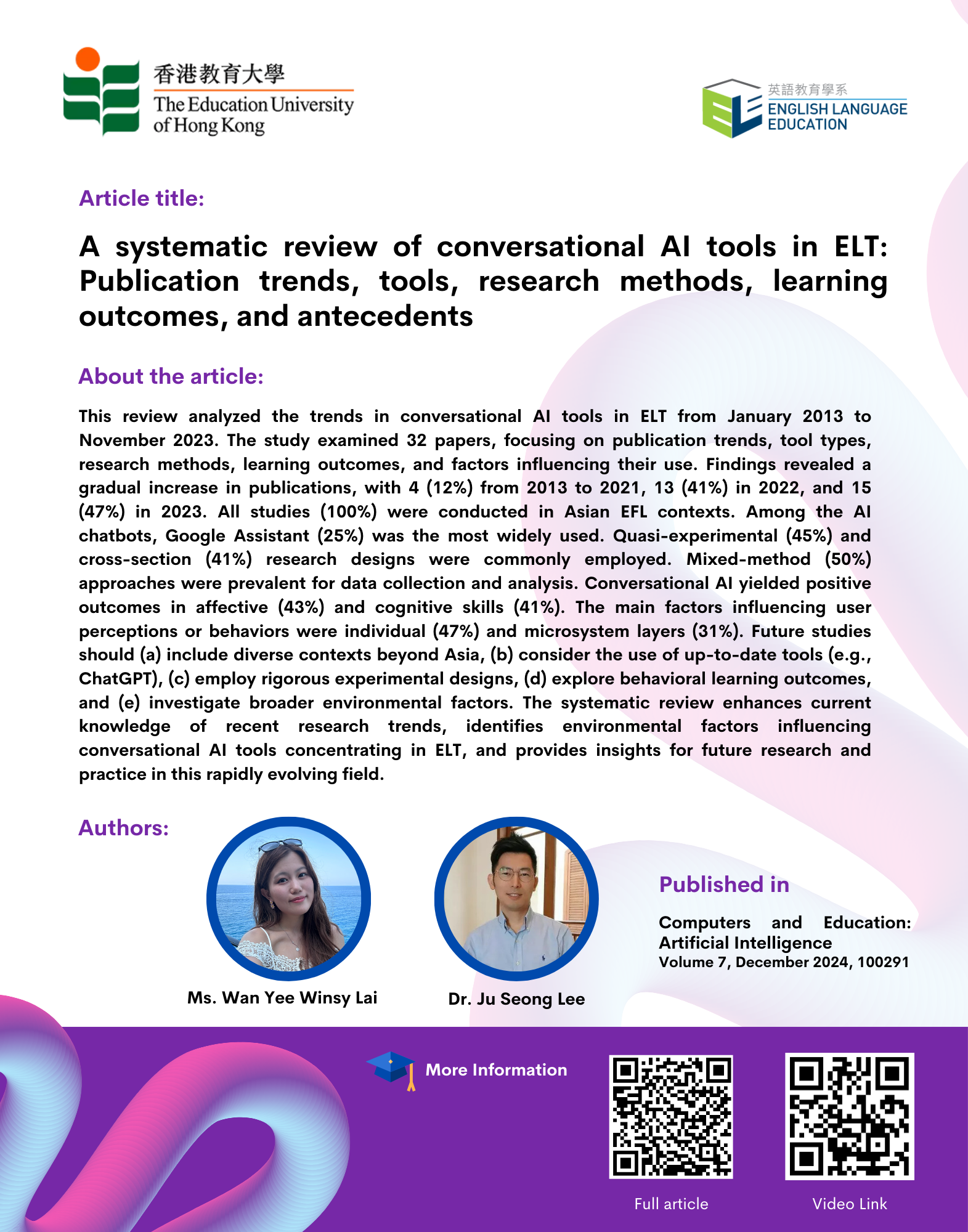
ELE's Open Knowledge Poster (#31)

Investigating the relationship between Iranian parents’ demographic factors and their mediation of children’s digital gameplay at home
Dr SOYOOF JAHROMI, Seyed Ali, Neumann, M., Reynolds, B.L. et al.
Abstract
Previous studies have shown that demographic factors can influence parental mediation strategies during children’s digital gameplay. However, little is known about maternal and paternal mediation in Iranian families. This study examined the relationship between maternal and paternal mediation (restrictive, active, viewing, technical, and laissez-faire) and demographic profiles (gender, age, socioeconomic status (SES), and education level) during the digital gameplay of children aged 6–10 years. Understanding this relationship is key to developing age-appropriate, culturally sensitive strategies to guide children’s digital interactions. A sequential mixed-methods study involving 210 Iranian parents (167 mothers and 43 fathers) was conducted, including a survey and follow-up interviews with 10 parents (8 mothers and 2 fathers), to explore their role in mediating children’s digital gameplay. The quantitative results showed a strong positive relationship between mothers’ technical and active mediation and education level and between fathers’ education, viewing, and restrictive mediation. However, a negative correlation was found between fathers’ education and laissez-faire mediation. Qualitative interviews revealed that both mothers and fathers tend to mediate children’s digital playtime towards more educational games, using primarily restrictive and active co-playing mediation strategies. Iranian parents, particularly fathers, may benefit from adopting more technical and active co-playing mediation to further support their children’s digital gameplay at home. Sociocultural norms, especially Islamic-Iranian norms, may influence parental mediation of children’s digital gameplay.
- Soyoof, A., Neumann, M., Reynolds, B.L. et al. Investigating the relationship between Iranian parents’ demographic factors and their mediation of children’s digital gameplay at home. Educ Inf Technol (2024). https://doi.org/10.1007/s10639-024-13194-w
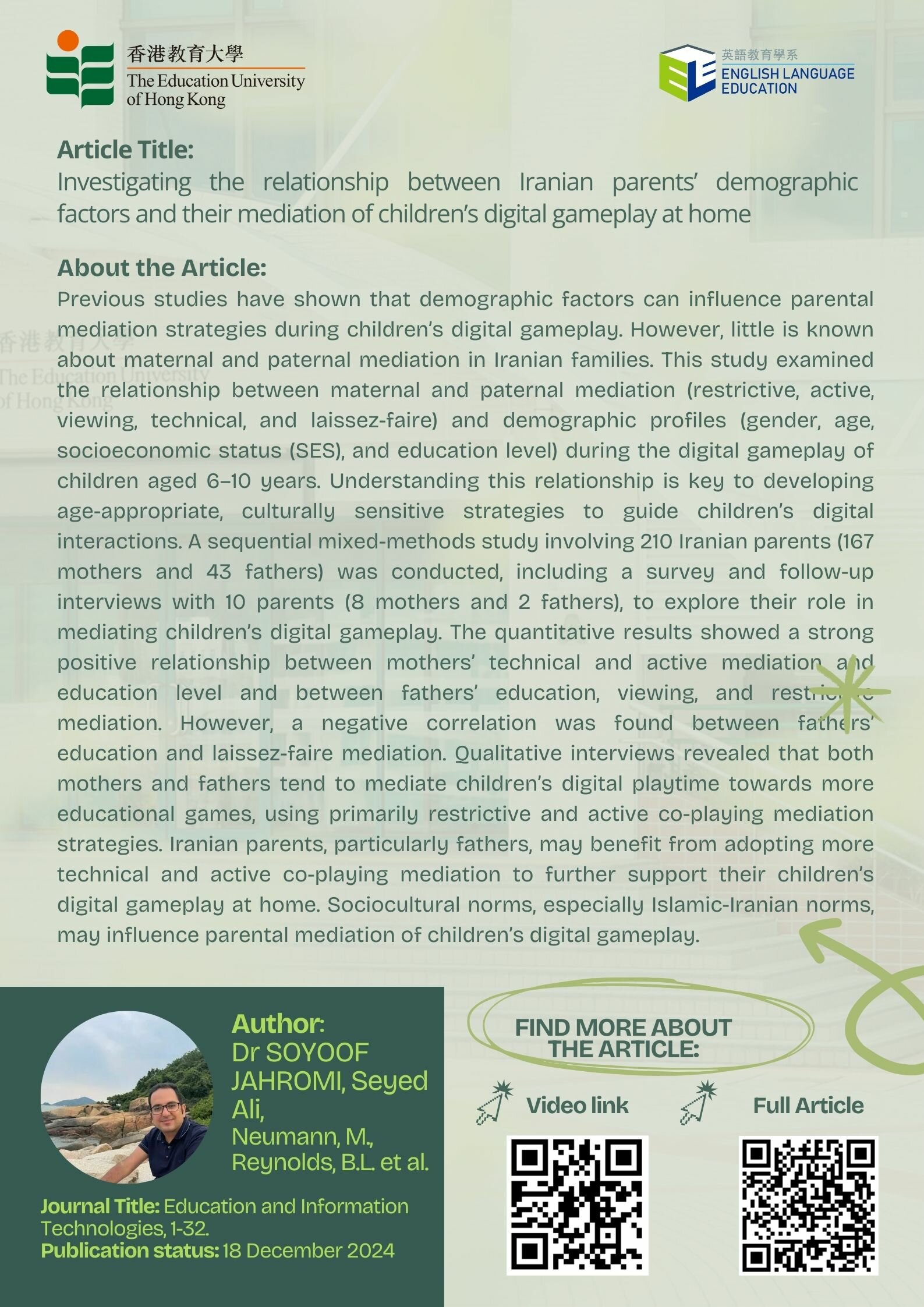
ELE's Open Knowledge Poster (#32)

Standardized Tests and Within-Group Segregation: The Not-So-Optimal ESL Classroom for Long-Term English Learners
Dr UYSAL Huseyin
Abstract
Reclassification is a critical threshold when English Learners (ELs) exit specialized language services and access all-English mainstream classrooms. Despite the mandates of the Every Student Succeeds Act, reclassification rates and time remain a pressing problem. A product of this malfunctioning system has been long-term ELs (LTELs). This article focuses on the social consequences of language assessment and attends to the stories of three LTELs at a rural high school in the southeastern United States. It examines the impact of ability-grouping through standardized tests on the social fabric of an English as a Second Language (ESL) classroom. Data come from semi-structured personal interviews and observations in ESL and content-area classes. The thematic narrative analysis points to a reclassification system that functions primarily based on test scores. State-mandated tests silence LTELs by classifying them in the same category with newcomer ELs. This system targets the standardization of their identities by disregarding the diversity within the ELs in terms of instructional needs and social, linguistic, academic, and cultural resources. These tests pose an insuperable social conflict and tension between the LTELs and newcomer ELs. To this end, I claim that state-mandated tests are hegemonic devices that might cause hierarchies in ESL classrooms and within-group segregation of ELs. The social consequences of testing need to be investigated in-depth to revamp the educational landscape for LTELs.
- Uysal, H. (2022). Standardized tests and within‐group segregation: The not‐so‐optimal ESL classroom for long‐term English learners. TESOL Quarterly, 56(4), 1471-1485. https://doi.org/10.1002/tesq.3187
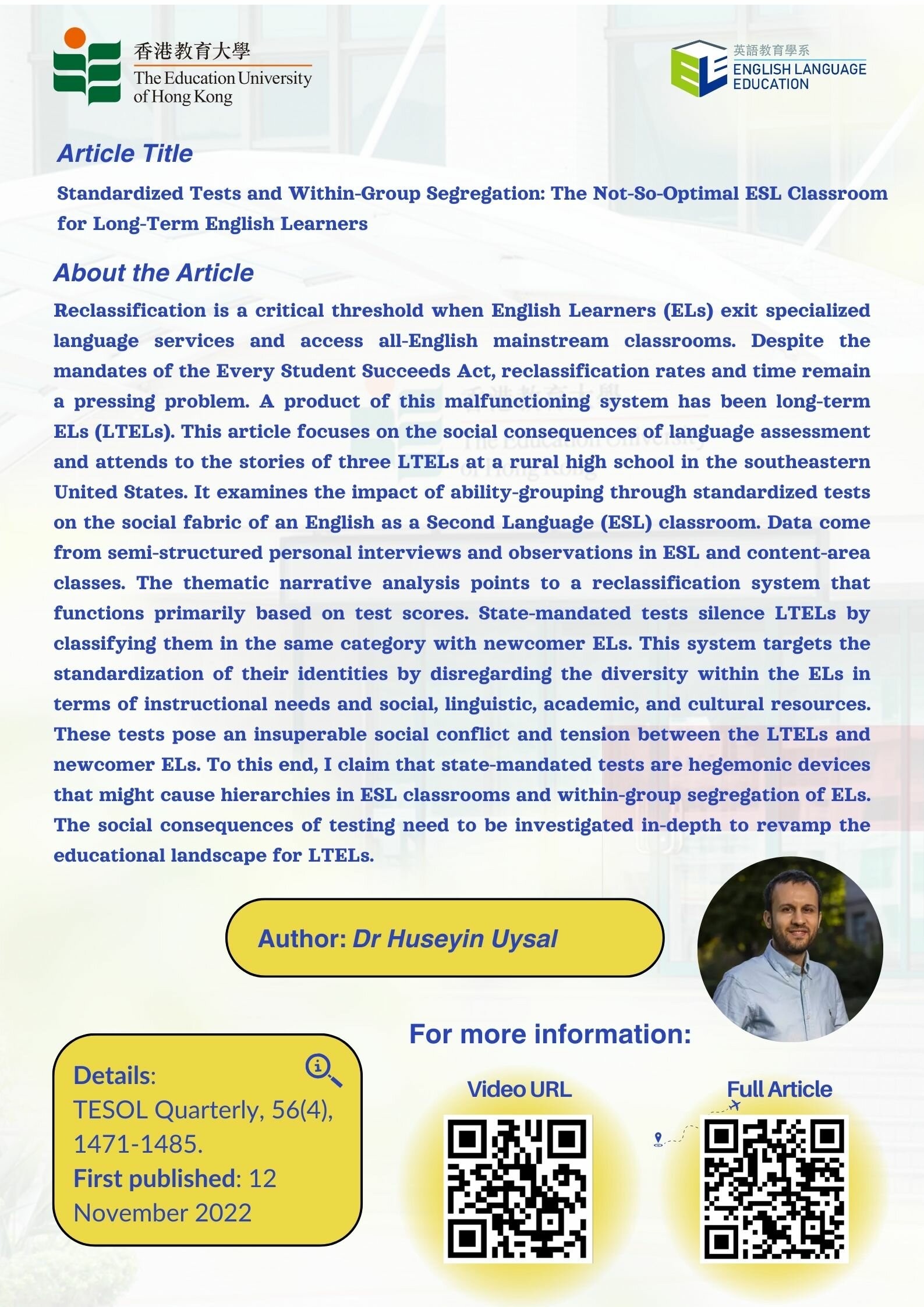
ELE's Open Knowledge Poster (#33)

Beyond traditional note-taking: Comparing the effects of collaboratively-generated versus instructor-provided notes on recall and writing performance
Dr FANGUY II, Michael Paul
Abstract
Note-taking is generally regarded as an effective learning strategy, but it is also cognitively demanding. Students often omit salient information in their notes due to the burden of trying to listen while writing down what they hear. Two alternative forms to traditional note-taking are online collaborative note-taking and instructor-provided notes. The former strategy allows students to work together online in small groups to share the burden of note-taking as well as the benefits of the collaborative document they produce together. The latter strategy involves the course instructor providing students with a complete set of notes, freeing students cognitively to listen and make connections with the lecture content. However, research on these two approaches remains sparse, and thus far, no study has compared their effects on learning performance. Therefore, the present study compared the learning performances of 161 students divided into two treatment conditions within a flipped learning environment: one where students took collaborative notes and another where students received notes provided by the instructor. Quiz scores showed no differences between the two conditions, but measures of both group and individual writing quality were significantly higher in the online collaborative note-taking condition than with the instructor-provided notes.
- Fanguy, M. (2025). Beyond traditional note-taking: Comparing the effects of collaboratively-generated versus instructor-provided notes on recall and writing performance. Australasian Journal of Educational Technology. https://doi.org/10.14742/ajet.9446
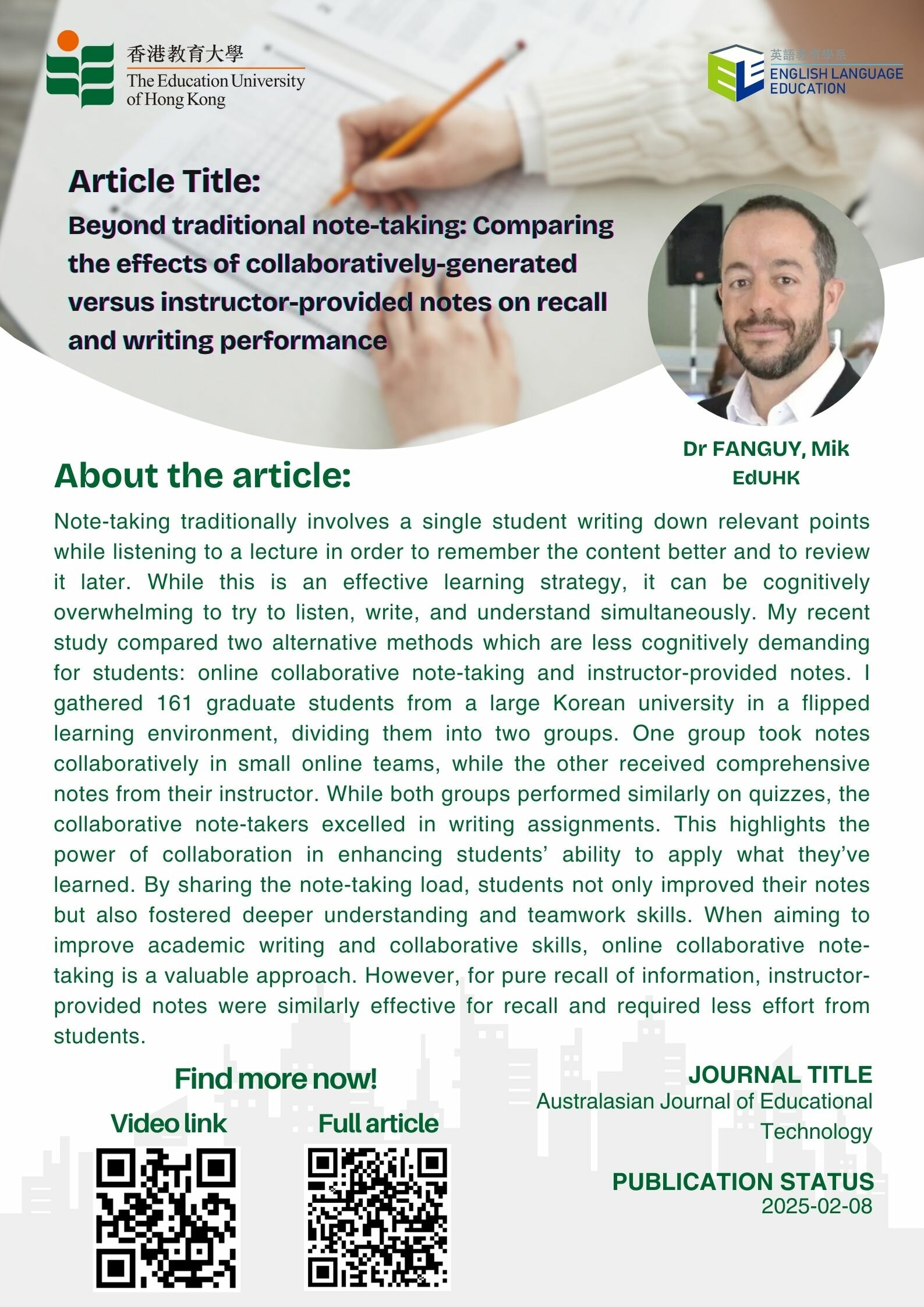
ELE's Open Knowledge Poster (#34)

Investing in and divesting from learning-to-teach practices: a critical ethnography of a teacher of English in China
Dr ZHANG, Yue Ellen
Abstract
Foreign or second-language (L2) pre-service teachers (PSTs) are simultaneously learners and teachers of the target language, adding to the complexity of teacher education. How these two identities are intertwined with their pedagogical beliefs and dominant ideologies has not been fully investigated, especially with PSTs in longitudinal studies. To fill this gap, this 15-month critical ethnography followed Ariel, a Chinese PST of English, as she transitioned from learner to teacher in an undergraduate teacher education programme. Drawing on a model of L2 investment and data collected from interviews, classroom observations, participant artefacts, diaries, and narratives, this study demonstrates how Ariel started the journey with a strong motivation to learn and teach English but did not remain invested in her teacher identity and divested from certain English learning and teaching practices that index ideological conflicts. Pedagogical implications are provided for PSTs to be empowered by opportunities that accentuate their beliefs and voices.
- Zhang, Y. (2025). Investing in and divesting from learning-to-teach practices: a critical ethnography of a teacher of English in China. Asia-Pacific Journal of Teacher Education, 53(2), 153-171.https://doi.org/10.1080/1359866X.2024.2431021

ELE's Open Knowledge Poster (#35)

“Just make them feel welcomed”: examining newcomer ESL students’ intersectional racism in Canadian schools
Dr Pramod K SAH
Abstract
This study examines the role of multilingual and multimodal literacy engagement in supporting the integration of newcomer students, emphasizing digital technologies and diverse multimodal texts. Utilizing a workshop methodology, the interactive and participatory research process empowered participants to use their home language, culture, and religion to influence their English language learning and social integration while contributing their perspectives to help shape the study’s discussions and outcomes. These newcomer and racially diverse students effectively (re)negotiated their linguistic, cultural, racial, and religious identities as it explored participants’ experiences and delved into conversations around how racialization is constructed and understood among stakeholders, focusing on students’ lived experiences of marginalization, identity construction, negotiation, and resistance, and suggesting potential avenues for change. The study identified challenges such as linguistic and cultural barriers to social integration and discrimination based on stereotypes and misconceptions regarding racial and religious identities and affiliation. It also unraveled the complexities posed by cultural disparities, particularly those involving religious practices, dress, and belief systems. These insights underscore the need for more inclusive school environments that acknowledge diversity, promote racial and religious tolerance, and address the intersectional challenges faced by racialized newcomer students.
- Zaidi, R., & Sah, P. K. (2025). “Just make them feel welcomed”: examining newcomer ESL students’ intersectional racism in Canadian schools. International Multilingual Research Journal, 19(2), 173-190. https://doi.org/10.1080/19313152.2025.2476838

ELE's Open Knowledge Poster (#36)

Comparing classroom and digital settings: the role of basic psychological needs on EFL students’ IDLE engagement
Dr Artem Zadorozhnyy, Dr Ju Seong Lee
Abstract
English as a foreign language (EFL) students are increasingly learning English in extramural digital settings (informal digital learning of English; IDLE). Previous research has investigated the antecedents of IDLE engagement, focusing on basic psychological needs (BPNs) in classroom settings. However, little attention has been given to the role of BPNs in digital settings, where digital-native EFL students often fulfil their psychological needs. This study explores the relationship between two core BPNs – competence and relatedness – in both classroom and digital settings and IDLE engagement among 226 Kazakhstani university EFL students. Hierarchical multiple regression analyses indicate that, in the classroom, students who perceive themselves as more competent are more likely to engage in receptive and productive IDLE. Also, a higher sense of in-class relatedness strengthens the positive relationship between in-class competence and productive IDLE. In the digital settings, students who perceive themselves as more competent are more likely to engage in receptive IDLE, while competence alone does not directly lead to productive IDLE. A higher sense of relatedness positively moderates the links, amplifying the connection between competence and engagement in both receptive and productive IDLE. These findings suggest that educators can enhance EFL students’ IDLE engagement by designing and recommending activities that foster competence and a sense of community in both classroom and digital settings.
Zadorozhnyy, A., & Lee, J. S. (2025). Comparing classroom and digital settings: the role of basic psychological needs on EFL students’ IDLE engagement. ReCALL, 1–18. doi:10.1017/S0958344025000059

ELE's Open Knowledge Poster (#37)

From Tools to Discourses: In Conversation with James Paul Gee on Literacy and Artificial Intelligence
Dr Ali Soyoof, Dr James Paul Gee, and Dr Guangxiang Leon Liu
Abstract
Professor James Paul Gee stands as a pioneering scholar whose work traverses literacy studies, sociolinguistics, and digital learning. His theory of ‘Discourses’, defined as socially situated ways of being that integrate language, values, and practices, has fundamentally reshaped how educators and researchers conceptualize literacy beyond traditional print boundaries and into the domains of identity formation and social participation. As Mary Lou Fulton Presidential Professor Emeritus at Arizona State University, his interdisciplinary contributions span critical theory, video game-based learning, and digital literacies, offering nuanced perspectives on human cognition and engagement across contexts. This conversation explores his insights into the evolving nature of literacy in relation to his Discourse theory, particularly in light of recent developments in generative artificial intelligence (AI) that are transforming notions of authorship, meaning-making, and literacy practices in contemporary society.
Soyoof, A., Gee, J. P., & Liu, G. L. (2025). From Tools to Discourses: In Conversation with James Paul Gee on Literacy and Artificial Intelligence. RELC Journal, 0(0). https://doi.org/10.1177/00336882251355879

ELE's Open Knowledge Poster (#38)

Critical review of instructional approaches to graduate- level research writing in science, technology, engineering, and mathematics
Dr Mik Fanguy, Dr Holly Wang, and Dr Kyungmee Lee
Abstract
For graduate students in science, technology, engineering and mathematics (STEM), research writing is an essential skill, yet many struggle to produce work of sufficient quality. This critical review examines the instructional approaches to graduate research- writing for STEM majors, as outlined in published journal manuscripts. A total of 29 articles were analysed using a framework that evaluates two key instructional aspects: hours of instructional time and discipline- specificity of the writing instruction. The findings reveal an important contradiction in the way that universities approach graduate research writing instruction in STEM fields: although university administrators and faculty members identify research- writing as a vital but lacking skill among their graduate students, relatively few instructional hours are devoted to this topic, and what instruction is provided is general, rather than specifically tailored to students' respective discipline. We argue that enhancing research writing instruction is vital not only for improving publication outcomes but also for fostering long- term professional development. By integrating online learning materials and recognising the importance of informal learning experiences, universities can create a more effective and comprehensive writing instruction framework. This research underscores the urgent need for institutions to prioritise dedicated, discipline- specific writing courses to better prepare STEM graduate students for the demands of their fields.
Fanguy, M., Wang, H., & Lee, K. (2025). Critical review of instructional approaches to graduate‐level research writing in science, technology, engineering, and mathematics. Review of Education, 13(2), e70080. https://doi.org/10.1002/rev3.70080

ELE's Open Knowledge Poster (#39)

Toward equitable classrooms: Translanguaging for adolescent emergent multilinguals
Dr. Huseyin Uysal and Dr. Zhongfeng TIAN
Abstract
This editorial piece provides an introduction to our special issue on instruction and assessment practices in the schooling of adolescent emergent multilinguals, and a comprehensive overview of the evolution of translanguaging from its origins to its current application as a socio-cognitive-political framework in multilingual education. We discuss its infusion in pedagogical practices to promote equitable learning opportunities for adolescent learners. The special issue highlights both the theoretical underpinnings of translanguaging and its practical applications, particularly in the underexplored area of assessment, offering a fresh perspective on fostering inclusive, dynamic, and culturally sustaining classrooms.
- Uysal, H., & Tian, Z. (2025). Toward equitable classrooms: Translanguaging for adolescent emergent multilinguals. Linguistics and Education, 86, Article 101404. https://doi.org/10.1016/j.linged.2025.101404





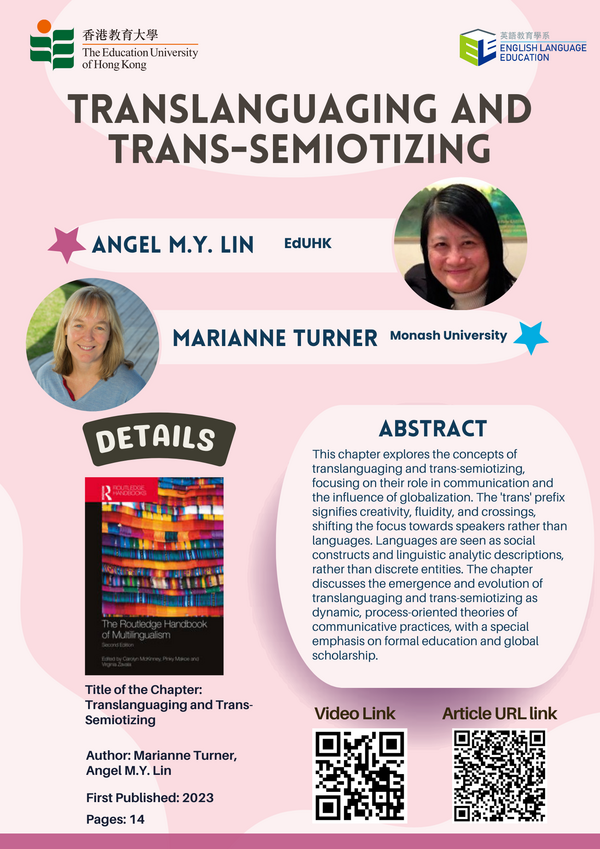
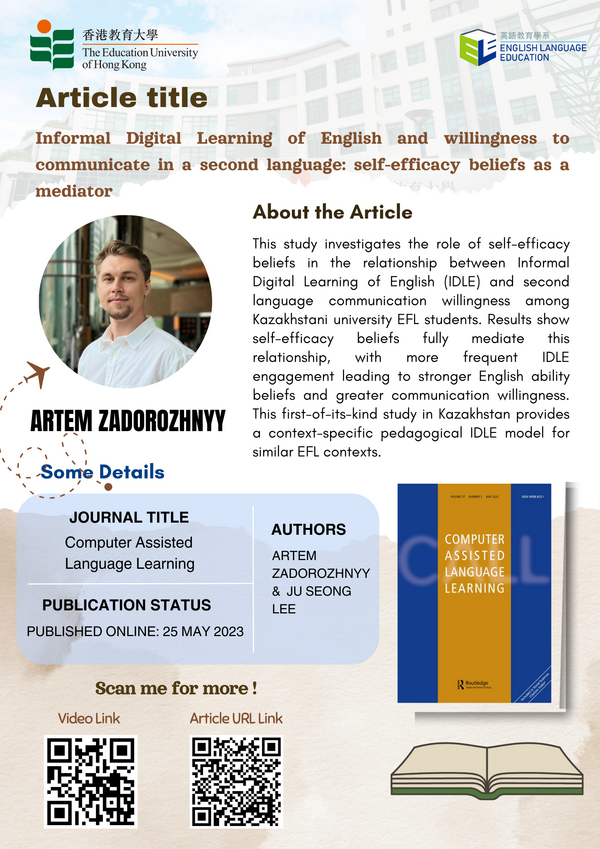
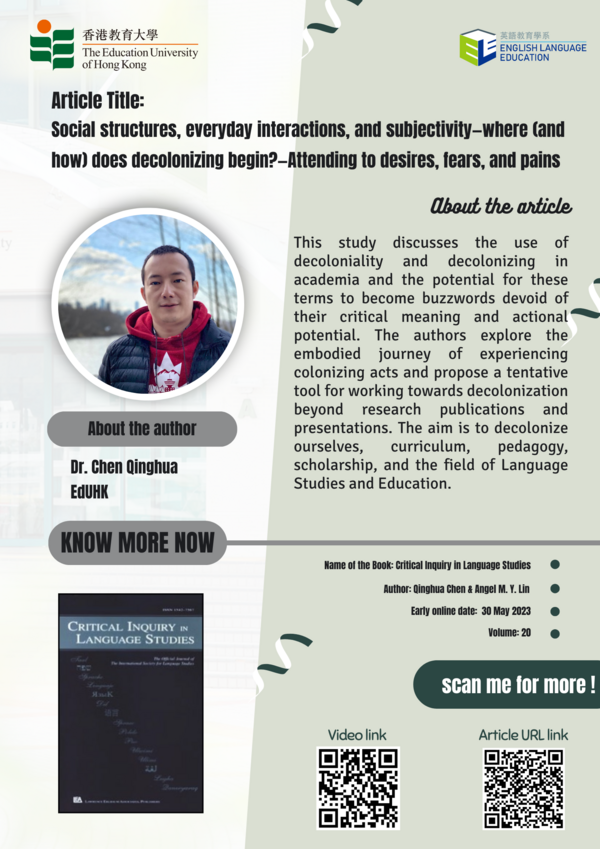
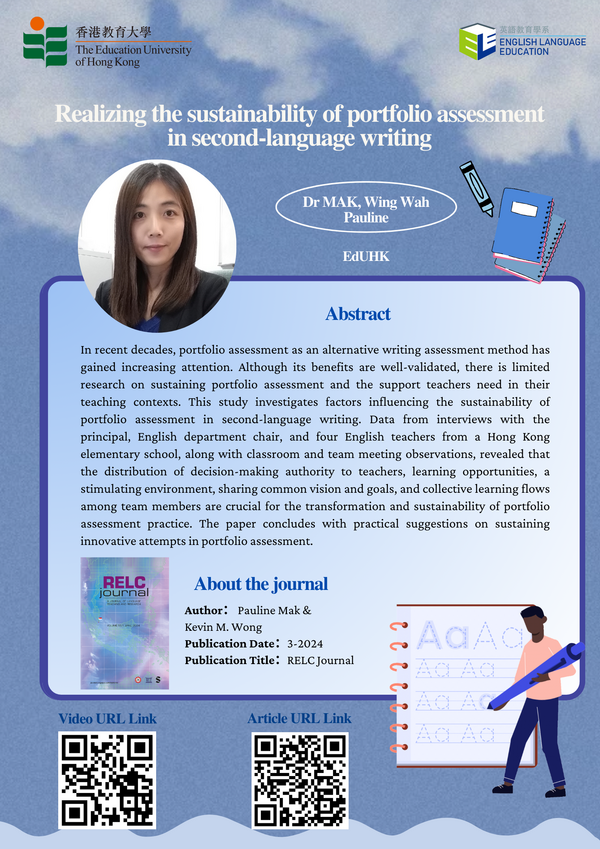
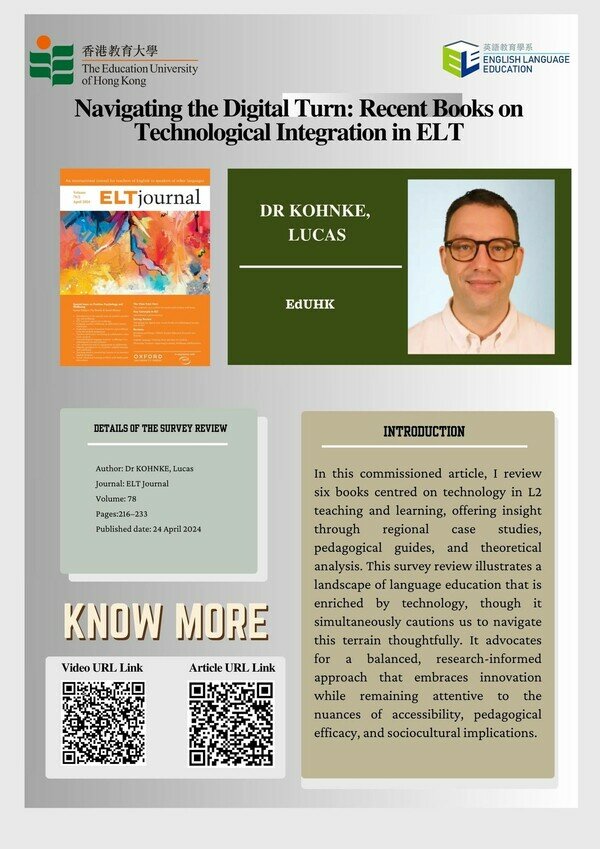
.png)
